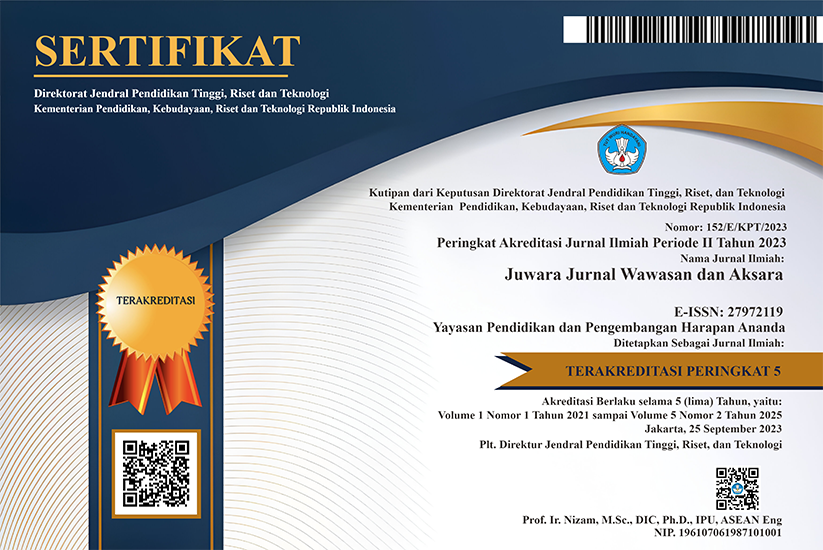Exploring the Implementation of Google Classroom in Online English Language Learning: A Literature Review
DOI:
https://doi.org/10.58740/juwara.v5i2.658Keywords:
Google Classroom, English Language Learning, Digital Learning, Literature ReviewAbstract
This study aims to explore the implementation of Google Classroom in online English learning, focusing on its impact on student learning outcomes, motivation, and learning independence. The method used was a qualitative descriptive literature study, which analyzed nine scientific articles published between 2019 and 2024. The study collected data from various studies that discussed the use of Google Classroom in English language learning at various levels of education, by identifying the benefits, challenges, and aspects that affect its effectiveness. The results show that the use of Google Classroom significantly improves student engagement, time efficiency, and English learning outcomes, despite challenges related to digital infrastructure such as unstable internet connections and device limitations. Additionally, the platform supports self-paced learning by giving students the freedom to access materials and complete assignments on their schedules. The study also found that Google Classroom facilitates collaboration between students and teachers, improving interaction and communication. The contribution of this research lies in the comprehensive mapping of the effectiveness of Google Classroom in online English learning, as well as providing recommendations for improving digital literacy training for teachers and developing educational infrastructure, in order to maximize the potential of technology in learning.
References
Abidin, Z., & Saputro, T. M. E. (2020). Google classroom as a mathematics learning space: potentials and challenges. Journal of Physics: Conference Series, 1567(2), 022094. https://doi.org/10.1088/1742-6596/1567/2/022094
Afandi, M. D., & Saputri, T. (2020). The Effectiveness of Google Classroom for Online Discussions. Exposure?: Jurnal Pendidikan Bahasa Inggris, 9(2), 322–331. https://doi.org/10.26618/exposure.v9i2.4179
Akcil, U., Uzunboylu, H., & Kinik, E. (2021). Integration of Technology to Learning-Teaching Processes and Google Workspace Tools: A Literature Review. Sustainability, 13(9), 5018. https://doi.org/10.3390/su13095018
Alenezi, M., Wardat, S., & Akour, M. (2023). The Need of Integrating Digital Education in Higher Education: Challenges and Opportunities. Sustainability, 15(6), 4782. https://doi.org/10.3390/su15064782
Ayu, M., & Sari, F. M. (2021). Exploring English Teachers’ Strategies in Managing Online Learning through Google Classroom. ELT Worldwide: Journal of English Language Teaching, 8(Vol 8, No 2 (2021)), 318–330.
Clark-Wilson, A., Robutti, O., & Thomas, M. (2020). Teaching with digital technology. ZDM, 52(7), 1223–1242. https://doi.org/10.1007/s11858-020-01196-0
Dash, S., Samadder, S., Srivastava, A., Meena, R., & Ranjan, P. (2022). Review of Online Teaching Platforms in the Current Period of COVID-19 Pandemic. Indian Journal of Surgery, 84(S1), 12–17. https://doi.org/10.1007/s12262-021-02962-4
Doranggi, S., & Rizka, A. (2025). Analysis of the Effectiveness of Online Learning Based on Google Classroom on High School Students’ Learning Achievement. Indonesian Journal of Education Research (IJoER), 6(1), 45–52. https://doi.org/10.37251/ijoer.v6i1.1481
Gebre, E. (2022). Conceptions and perspectives of data literacy in secondary education. British Journal of Educational Technology, 53(5), 1080–1095. https://doi.org/10.1111/bjet.13246
Hastomo, T., & Zulianti, H. (2021). EFL Students’ Perceptions on the Use of Google Meet in Online Learning During the Time of Coronavirus: A Literature Review. SELTICS, 4(2), 102–109. https://doi.org/10.46918/seltics.v4i2.916
Klimova, B., Pikhart, M., Polakova, P., Cerna, M., Yayilgan, S. Y., & Shaikh, S. (2023). A Systematic Review on the Use of Emerging Technologies in Teaching English as an Applied Language at the University Level. Systems, 11(1), 42. https://doi.org/10.3390/systems11010042
Makarim, H. N., & Maya Sari, D. M. (2021). Google Classroom in the English Language Teaching Learning during Pandemic Covid-19. In Jurnal Pendidikan Bahasa (Vol. 10, Issue 2, pp. 141–150). https://doi.org/10.31571/bahasa.v10i2.2878
Pangrazio, L., Godhe, A.-L., & Ledesma, A. G. L. (2020). What is digital literacy? A comparative review of publications across three language contexts. E-Learning and Digital Media, 17(6), 442–459. https://doi.org/10.1177/2042753020946291
Periani, K., & P. E. D, S. (2022). Students’ Perception on The Use of Google Classroom in English Online Learning at A Rural Junior High School. Jurnal Pendidikan Bahasa Inggris Undiksha, 9(3), 256. https://doi.org/10.23887/jpbi.v9i3.43763
Shadiev, R., & Wang, X. (2022). A Review of Research on Technology-Supported Language Learning and 21st Century Skills. Frontiers in Psychology, 13. https://doi.org/10.3389/fpsyg.2022.897689
Spiteri, M., & Chang Rundgren, S.-N. (2020). Literature Review on the Factors Affecting Primary Teachers’ Use of Digital Technology. Technology, Knowledge and Learning, 25(1), 115–128. https://doi.org/10.1007/s10758-018-9376-x
Sudaryani, H., Rukmini, D., & Ardiasih, L. S. (2023). Students’ Perceptions on Benefits and Challenges in Using Google Classroom for Online English Learning during Pandemic Covid-19. Jurnal Pendidikan Bahasa Inggris Undiksha, 11(1), 24–32. https://doi.org/10.23887/jpbi.v11i1.59176
Timotheou, S., Miliou, O., Dimitriadis, Y., Sobrino, S. V., Giannoutsou, N., Cachia, R., Monés, A. M., & Ioannou, A. (2023). Impacts of digital technologies on education and factors influencing schools’ digital capacity and transformation: A literature review. Education and Information Technologies, 28(6), 6695–6726. https://doi.org/10.1007/s10639-022-11431-8
Verlinsti Vania Tamala, Luh Putu Artini, & Ni Luh Putu Eka Sulistia Dewi. (2024). Utilizing Google Classroom for English Instruction: Positive and Negative Impacts in a High School Setting. Esteem Journal of English Education Study Programme, 7(2), 546–554. https://doi.org/10.31851/esteem.v7i2.15474
Vidyasari, R., Marsakawati, N. P. E., & Artini, L. P. (2022). Teachers’ Perception of the Use of Google Classroom To Assess English Skills. Language Literacy: Journal of Linguistics, Literature, and Language Teaching, 6(1), 39–50. https://doi.org/10.30743/ll.v6i1.4788
Vo, T., Truong, D., & Nguyen, P. (2023). The impact of digital technology on content and language integrated learning in higher education: a systematic review of literature. ICTE Conference Proceedings, 3, 137–147. https://doi.org/10.54855/ictep.23311
Wang, C., Chen, X., Yu, T., Liu, Y., & Jing, Y. (2024). Education reform and change driven by digital technology: a bibliometric study from a global perspective. Humanities and Social Sciences Communications, 11(1), 256. https://doi.org/10.1057/s41599-024-02717-y
Wei, Y. (2022). Toward Technology-Based Education and English as a Foreign Language Motivation: A Review of Literature. Frontiers in Psychology, 13. https://doi.org/10.3389/fpsyg.2022.870540
Widiyatmoko, A. (2021). The effectiveness of google classroom as a tool to support online science learning: a literature review. Journal of Physics: Conference Series, 1918(5), 052069. https://doi.org/10.1088/1742-6596/1918/5/052069
Yulistia, A. P., & Savitri, W. E. (2022). Junior High School Students Experiences in Google Classroom to Promote Autonomy in Online English Learning. Eltin Journal: Journal of English Language Teaching in Indonesia, 10(2), 88–102.
Downloads
Published
How to Cite
Issue
Section
License
Copyright (c) 2025 Rohman Adi Irawan, Dewi Sri Kuning

This work is licensed under a Creative Commons Attribution-NonCommercial 4.0 International License.
JUWARA: Jurnal Wawasan dan Aksara provides open access to anyone so that the information and findings in these articles are useful for everyone. This journal's article content can be accessed and downloaded for free, following the creative commons license used.




















